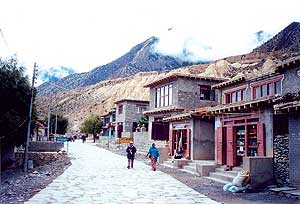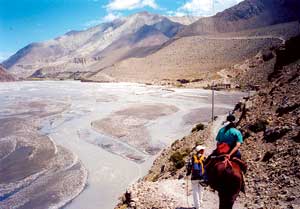 Following the contour of the river bed, and perilously close to the cliffs on either side, the aircraft flies over the towns of Lete, Tukuche and Marpha. The plane's shadow skims swiftly over apple orchards, terraces of pink buckwheat, across the sandy banks of the Kali Gandaki. A tight bank on finals brings the swirling grey waters out the left window and deep blue sky out the right, then we are bouncing on Jomsom's recently-asphalted runway and roaring to a stop.
Following the contour of the river bed, and perilously close to the cliffs on either side, the aircraft flies over the towns of Lete, Tukuche and Marpha. The plane's shadow skims swiftly over apple orchards, terraces of pink buckwheat, across the sandy banks of the Kali Gandaki. A tight bank on finals brings the swirling grey waters out the left window and deep blue sky out the right, then we are bouncing on Jomsom's recently-asphalted runway and roaring to a stop.
Outside, the clean and crisp mountain air seems vacuum-cleaned. Nilgiri's fluted ridges of ice tower over the deep green conifers at its base. In the morning, the sun shines from behind the mountain, giving it a hazy hue. But as the day wears on the mountain plays hide-and-seek with the clouds, and finally when the sun dips behind the tall himals to the west Nilgiri reflects its rosy light.
Life bustles around Jomsom airport in the mornings. Farmers from neighbouring villages sell apples and vegetables to the locals and to passengers flying out to Pokhara. Porters mill about hoping to find prospective clients. And then there are the locals, who just come to watch who comes and who goes. Jomsom-based civil servants throng to the airport terminal catching up on Kathmandu newspapers that come on the morning flight. By mid-morning, the legendary Kali Gandaki wind tunnel starts to show what it can do. The planes stop flying, the sand starts flying and people huddle inside homes and hotels.
A signboard at the airport alerts everyone that Mustang is a no-polythene bag district. In fact, alert police men and women in Pokhara airport will frisk and remove any plastic bags still in your possession. The streets in and around Jomsom are clean and litter free. The Mustangis' bid to free their district of the plastic menace that is plaguing the rest of the country has been assisted by the various organisations working in the area. A water refilling system is in place to reduce litter caused by discarded plastic water bottles. Established by ACAP in association with the New Zealand firm, Safe Drinking Water Stations, the project run by community groups in Kagbeni and Jomsom offers ozonated drinking water for locals and trekkers. Tshering Gurung, helps manage the station at Kagbeni that refills water-bottles at the rate of Rs 35 per litre for tourists and Rs 5 per litre for Nepalis.
Seventy-year Chhini Lhamu who lives in Samley across the river from the airport sells an average of Rs 350 worth of vegetables whenever she goes to the market. These days she's been selling apples too. "But syau (apples) can be jhyau (a bother) when they don't get you a good price," she says. "There comes a time when even our livestock get sick of these fruits!" Last year Chhini sold Rs. 60,000 worth of apples from the 70 or so apple trees in the family orchard.
 Every tree in and around Jomsom is heavy with red and yellow apples ripening gently under the balmy autumn sun. Exorbitant air freight costs, and the punishing mule ride to the road-head means that most of the fruits in the Kali Gandaki valley get either desiccated and candied or metamorphose into cider, brandy and wine. Thus while the rest of the country bites into expensive, stale and tasteless apples from India, fresh and juicy Mustangi apples continue to sell at Rs 20 a kg in Jomsom or are sniffed and nibbled by goats and miniature cows called lulus.
Every tree in and around Jomsom is heavy with red and yellow apples ripening gently under the balmy autumn sun. Exorbitant air freight costs, and the punishing mule ride to the road-head means that most of the fruits in the Kali Gandaki valley get either desiccated and candied or metamorphose into cider, brandy and wine. Thus while the rest of the country bites into expensive, stale and tasteless apples from India, fresh and juicy Mustangi apples continue to sell at Rs 20 a kg in Jomsom or are sniffed and nibbled by goats and miniature cows called lulus.
The Kali Gandaki cuts the world's deepest gorge between Annapurna and Dhaulagiri. Geologists say the river is older than the mountains and sliced through the Himalaya as it lifted. The gorge is a funnel linking the Tibetan plateau with the Gangetic plains to the south, and this is the reason for the fierce winds. The prevailing wind means the trees all lean northwards, with their branches pointing towards Tibet. From time to time, the "wrong" winds blow in from the plateau and that is when the elders in Thini take it as a bad omen and gather at a special chhorten above the village to pacify the wind spirits with special offerings.
The river itself spreads itself out after Kagbeni, filling the valley floor with sand, pebbles and boulders. In the monsoon, the water channels shift all the time, making it difficult to bridge the river. "Every year it washes off houses and farms," says Prem Gurung, a Jomsom resident. "It's futile trying to tame this wild river."
In a few weeks time, when the buckwheat ripens and turns black, the Kali Gandaki valley will see a different sort of southward flow-of migratory birds. Siberian geese and ducks all winging south in their long journey from Siberia to India. This is the superhighway across the Himalaya they follow from genetic memory from the times the mountains were younger. You can hear the honking of the geese far above the valley before you see them. They come down from the north in V-formations etched against the azure sky.
When the clouds obscure the mountains, the birds circle to gain height and finally disappear above the clouds to find their way out of the valley. When flying conditions are really bad, they are grounded like the planes and they come down to river banks and wait out the weather. "The villagers used to kill the birds and eat them, but not any more. Now they are protected," says Prem.
The clackety-clack of horseshoes is a familiar sound in these stoned-paved villages. Trees have protective coverings around their trunks to prevent hungry horses and mules from nibbling away the bark. The fields are all walled off to protect the crops. In the wide fan of a stream near Dhumba, fattened horses graze on the green grass. "This is the best season for them," says Prem. "Once winter sets in, there is no green at all."
Flights out of Jomsom all depend on the wind gods. The first question in everyone's mind in Jomsom every morning is: "Will the planes come in today?" Sometimes you have to wait a week, as turbulence over the Kali Gandaki, clouds or snow cancel flights. Pokhara is a 3-4 day trek away along some of the most spectacular scenery on earth. Go to Jomsom next week during the Mustang Festival, and enjoy the exotic locale of Nepal's cleanest town.


